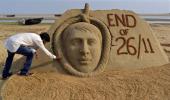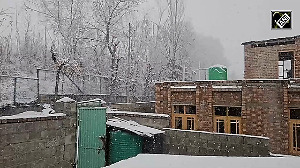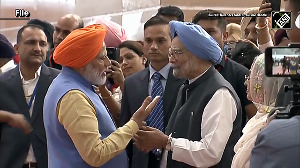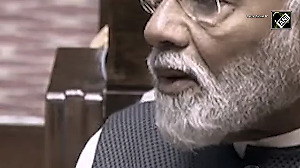'I was alone in the room, injured and facing possible death.'
'The terrorists had taken a head shot and since there was complete silence from my end, they thought that I was either dead or grievously injured...'
'I was now changing the position of the gun, sometimes firing from the top of the sofa, sometimes from the left and sometimes from the right side.'
'This was to confuse the terrorists and to manipulate them into thinking that there are two or more commandos in the room.'
A must read excerpt from Praveen Kumar Teotia's 26/11 Braveheart: My Encounter With Terrorists That Night.

On the night of November 26, 2008, Praveen Kumar Teotia led a team of MARCOs -- the Indian Navy commandos -- to neutralise the terrorists at the Taj Mahal hotel in Mumbai.
During the operation, the terrorists fired at MARCO Teotia. Four bullets ripped through his chest. A lung was punctured and four ribs were shattered.
Doctors attending to him later declared that his life had been cut short, that he could never swim or run again.
A grateful nation awarded MARCO Praveen Kumar Teotia with the Shaurya Chakra for his courageous role in the operation that rescued 150 guests at the Taj.
After he retired, MARCO Teotia proved the doctors wrong. He has run several marathons and taken part in the Ironman championship.
He is now a life coach and helps trains state police commandos.
This is his account of what happened after he was shot by the terrorists:
I lay there for a while, unconscious.
Then all of a sudden, I woke up in extreme pain and agony. The pain was so acute that it made me conscious. Somewhere at the back of my neck, I could feel a burning sensation. Well... sensation would be an understatement. It felt as if my skin had been ripped apart and now the scorching heat was gradually eating my flesh.
I managed to move my hand there to see if I could feel anything.
As soon as I touched the spot where the 'fire of hell' had engulfed my neck, I felt something wet.
It was warm, and as soon as I probed it, more of it came gushing out. I was soaked in my own blood. It was a head shot.
The bastards knew their job well. They had aimed at my head and wanted to finish me there and then. Fair enough! They were following their orders and I was at the receiving end of their gun.
But they had not been completely successful and instead, the bullet had whizzed past my head, burn through the skin and tear open the flesh.
It was still dark and my hands stretched for help.
It was in vain. I could not find my buddy near me. He had fallen back.
In fact, the entire team had fallen back in a fraction of a second. I was now alone in the room, injured and facing possible death.
The terrorists had taken a head shot and since there was complete silence from my end, they thought that I was either dead or grievously injured.
In such a scenario, I know the next thing an attacker would do.
He would come close to the target and to double confirm his catch, would shoot at point-blank range. I had very little time left.
I had to quickly adapt my eyes to the darkness and look for cover.
I was on the floor now and my back was towards the wall.
I searched for my weapon and after a few painful and anxious minutes, I found the sling of my gun, which was around my neck.
What a discovery it was! A gun is an extension of a soldier's body, a part of his personality.
Without it, a soldier is half dead. But now I was alive again. It gave me a renewed sense of confidence and at least a plan to work on. But whatever I had to do, it had to be done quickly and quietly.
Suddenly, a terrible spasm of pain started from near my left temple and overpowered my strength.
I had never been in such pain.
It felt like a thousand hammers were pounding my skull and molten lava had been poured inside my ear.
I tried touching my ear but couldn't find it. There was no ear left. Just some tissues hanging and dripping blood.
The pain made me want to cry my heart out as that would have eased this torture a bit, psychologically.
But that would be a foolhardy thing to do.
With all my strength, I clutched the carpet beneath me and with all the pressure I could muster, I clenched it.
I was trying to neutralize all the pain with this forceful grip. It worked and I could at least think of planning my next move.
An injured man lying alone in an enemy's catchment area and without any help could be a dead man soon.
I knew this and had to do something quickly.
My first aim was to find myself a cover.
There was a sofa lying near me and there was some gap between the wall and sofa. This could be a perfect position, I told myself.
Placing myself between the sofa and wall and positioning my weapon atop my thigh I was back again in the shooting position.
My injury was near the head and ear -- basically, above my heart.
As we were taught during our training, the bleeding is always less when the injury is above the heart.
If the bullet had hit me in the shoulder or stomach, it would have bled more and required immediate medical intervention.
I knew that I could survive for some more time without any medical aid.

I did the next best thing.
I started firing. Another burst of fire greeted me from the other side.
Thankfully, this time I had cover. I was now changing the position of the gun, sometimes firing from the top of the sofa, sometimes from the left and sometimes from the right side.
This was only to confuse the terrorists and to manipulate them into thinking that there are two or more commandos in the room. Perhaps that would deter them a bit.
A few minutes passed in this exchange of fire.
The bullets from my side met with a burst of shots from them.
I had to engage them for some time, at least enough for my team to come inside, attack them and rescue me.
With my fingers on the trigger and my body behind the sofa, I kept firing. They kept firing back.
This exchange must have continued for fifteen minutes, when I realized that I was only engaging with them.
And this would not last long.
Something else needed to be done.
Albert Einstein once said that if the problem is not getting solved, it is because we are applying the same set of tools over and over again to get to the solution.
A new approach was required to address the problem.
Something drastic needed to be done.
I had to shock them and make them believe that I was not the only vulnerable one in the room. They were, too.
Excerpted from 26/11 Braveheart: My Encounter With Terrorists That Night by Praveen Kumar Teotia, with the kind permission of the publishers, Rupa Publications India.
Feature Presentation: Aslam Hunani/Rediff.com











 © 2024 Rediff.com -
© 2024 Rediff.com -